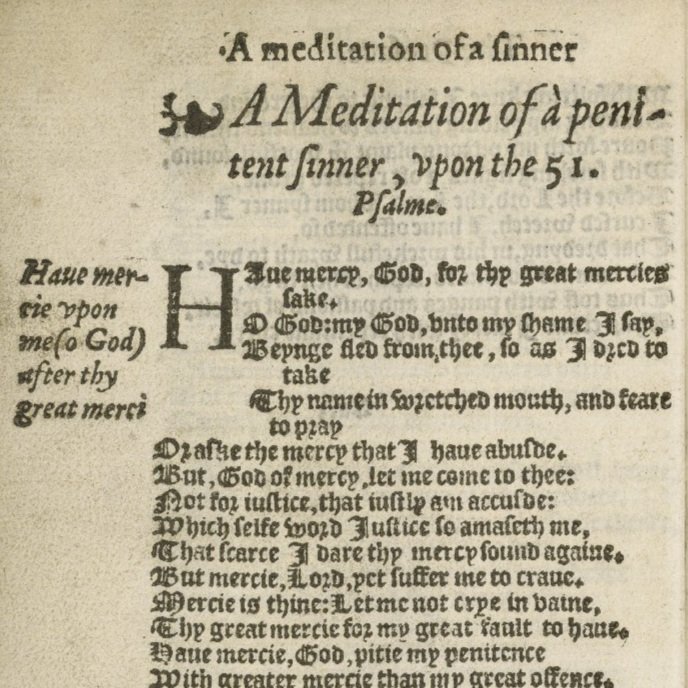Key Texts
Key Texts is a postgraduate series that seeks to re-think which texts occupy places in our teaching and research. Each post takes a single text as its subject, making the case for its status as a ‘key text’. In some cases, this involves celebrating essays vital to the development of an academic discipline, in others, excavating sixteenth-century publications that have been long overlooked. In all instances, posts ask us to reflect upon our disciplinary canons, and on the voices and experiences we choose to amplify. In what directions is early modern studies headed? Which texts need to be part of its future? Encompassing canonical and non-canonical texts, as well as a range of primary and secondary materials, this series begins to suggest some possible answers to these questions.

A Meditation of a Penitent Sinner
Anna-Rose Shack makes the case for the importance of a 1560 sonnet sequence, appended to a volume of sermon translations by Anne Lock. Shack shows us how attention to an ‘outstanding example of poetic innovation’ can further conversations about historical women’s writing, the development of Protestant poetics, and the interplay between poetic form and gendered voices.
Use the Word Cloud to group posts by shared theme. You can reset your filter by clicking here.
- Annotation
- Attribution
- Authorship
- Belief
- Bestseller
- Book History
- Calvin
- Censorship
- Clergy
- Collaboration
- Copyright
- Craft
- Diplomacy
- Education
- Emotion
- Essay
- Europe
- Everyday
- Experimentation
- Faith
- Family
- Friendship
- Gender
- History
- Homosocial
- Humanism
- Illustration
- Innovation
- Knowledge
- Law
- Marginalia
- Market
- Medicine
- Nonconformist
- Pamphlet
- Parliament
- Persona
- Poetics
- Poetry
- Politics
- Propaganda
- Public
- Reading
- Recipes
- Reformation
- Religion
- Restoration
- Revolution
- Science
- Selfhood
- Sonnet
- Status
- Translation
- Uncertainty
- Voice
- Witchcraft
- Women
Or search the series by way of a term or phrase of your choice:
Key Texts Image Bibliography
A Meditation of a Penitent Sinner: ‘A Meditation of a Penitent Sinner’, appended to Jean Calvin, Sermons de Jehan Calvin, trans. Anne Lock (London, 1560). LUNA: Folger Digital Image Collection. (CC BY-SA 4.0).
Compendium Maleficarum: Francesco Maria Guazzo, Compendium maleficarum (Mediolani [i.e. Milan], 1608), octavo (Sp Coll Ferguson Ao-a.60). Image: Glasgow University Library.
Declaration of His Highness William Henry: The Declaration of his Highness William Henry (The Hague, 1688). Image courtesy Leiden University.
How Gabriel Harvey Read His Livy: Titus Livius Patavini [Livy], T. Liuii Patauini Romanae historiae principis decades tres (Basel, 1555). Princeton University Library, Department of Rare Books and Special Collections, South East (RB) (Ex) PA6452. A2 1555q.
Room For The Cobler of Gloucester And His Wife: Ralph Wallis, Room For The Cobler of Gloucester And His Wife With Several Cartloads of Abominable Irregular, pitiful stinking Priests (London, 1668). Courtesy of the British Library, digitized by Google Books project.
The Secrets: Secreti, The Secrets of the Reverend Maister Alexis of Piemont (London, 1595). Public Domain.
The Two Gentlemen of Verona: William Shakespeare, ‘The Two Gentlemen of Verona’ in Comedies, Histories, & Tragedies (London, 1623). LUNA: Folger Digital Image Collection.
Editor: Jonathan Powell (2023)